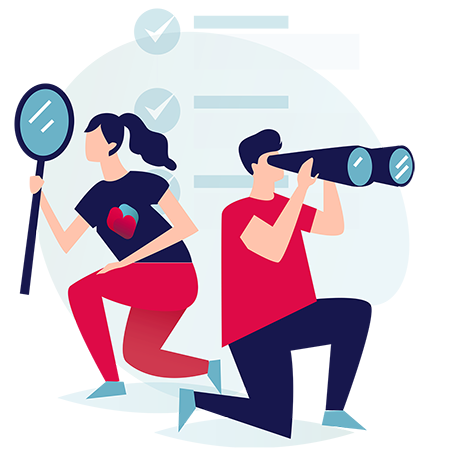- Simple, easy application
- We search lenders to get you the best deal
- 5-star customer service
- No impact on your credit score
- No upfront fees or hidden charges
Are you a homeowner or a tenant?

With Believe Loans on your side, you could get a secured loan with great interest rates.
The Covid-19 pandemic created numerous financial problems for households, and many people found themselves in debt. A secured loan is an excellent way to borrow money and get back on track financially, but some loan providers charge a fortune in interest.
While there are loan products available that won’t necessarily cost the earth, finding them is no easy feat.
As a secured loan broker, we specialise in working with clients from all backgrounds, helping them to find the best borrowing solution for their needs.
Getting a cheap loan that works for you can seem like you’re stuck in a maze with no apparent way out, but our advisors are here to help.
We’ll work with you to evaluate your financial circumstances and find a secured loan that works in the long term.
What are secured loans?
Secured loans are borrowing agreements that use collateral as security in their most basic form. For example, you can borrow money from a provider, but you’ll need to offer your home or other valuable assets to the provider.
If you fail to meet your monthly repayments, the loan company could take your home to recover their money.
There are different types of secured loans available, depending on your needs. They include mortgages, a homeowner loan, debt consolidation agreements, and bridging loans.
Mortgages
Most homeowners take out a mortgage to purchase a property. You pay the mortgage back each month until you fully own the house. Of course, if you default on the payments, the mortgage lender can repossess your home.

Homeowner Loans
Homeowner loans are a type of secured loan available to people who own their own homes. As the name suggests, these loans are secured against your property, so if you default on the loan, lenders could repossess your home.
However, homeowner loans can offer several benefits, including lower interest rates and longer repayment terms.
Debt Consolidation Loan
One of the most popular forms of a secured loan, debt consolidation arrangements enable you to merge your outstanding credit into one monthly payment. Doing this means you’ll spend less each month and can get your finances back on track.
Bridging Loans
Bridging loans basically ‘bridge’ the gap between two financial transactions. For example, if you are buying a property before selling your current home, you can use a bridging loan to cover the deposit cost.
Bridging loans are typically secured against property and are therefore only available to those with equity in their home. They can be an expensive form of finance, with high-interest rates and fees, so it is essential to consider all other options before taking out a bridging loan.
However, for those needing quick access to finance, a bridging loan can be an effective way to ‘bridge’ the gap.
How secured loans work
If a lender accepts you for a secured loan, they usually issue one large payment to you. However, some can also release smaller amounts of money over time, which is more convenient for people who’d prefer to access the funds in stages.
As long as you pay the loan back each month, you won’t have any problems. When you miss one payment, you’ll receive a reminder (similar to credit cards), but if you miss consecutive payments, the loan provider will probably start taking things more seriously.
When it becomes clear that you cannot meet your payment obligations, the lender will seize your property – or other assets – and recover their money by selling your home.
Sometimes, you can forge an agreement with the provider if your financial circumstances change; however, if there’s little chance that you can return to the monthly repayments, you’ll likely lose your property when the provider sells it at auction.


The difference between secured and unsecured loans
As the name suggests, an unsecured loan doesn’t require any collateral, so you can enter into it without owning a home or other valuable assets. While some people think this is the better solution, unsecured loans have some disadvantages.
Let’s take a look at the pros and cons of each.
Secured loan pros
Secured loans require some collateral, but if you’re a homeowner, these agreements can be worth it.
Low-interest rates
Most secured loans have low-interest rate agreements, which is beneficial if you don’t want to deal with crippling payments. The main reason for this is the extra security you offer as collateral.
Longer period of repayments
As secured loans use assets, you can look forward to longer repayment terms. Some of these agreements can last for years, which is different to unsecured loans that usually have a maximum period of five years.
Easier to get
As you can show that you have an asset to offer as security, a secured loan is easier to get. Most providers will look at your financial circumstances, but having less than excellent credit doesn’t necessarily mean you’ll be turned down.
Secured loan cons
As with everything, there are some disadvantages associated with secured loans. While these cons shouldn’t put you off, you need to consider them before deciding.
The loan-to-value ratio
Just because you own a house worth £280,000 doesn’t automatically mean that you’ll receive that amount through your loan. Lenders use a loan-to-value ratio to determine the amount you can borrow, depending on how much equity you own.
For example, if your home is worth £280,000, but your mortgage accounts for £200,000, you could only borrow £80,000 at the most.
You could lose your security
Owning a property gives people security, especially with skyrocketing rents. If you fail to meet your monthly repayments, losing your property is a real threat.
Unsecured loan pros
In many ways, an unsecured loan is the riskier option, but it might be the only borrowing solution for some people.
You don’t need any collateral
Secured loans require collateral, but unsecured loans do not. Unsecured loans don’t rule you out automatically if you don’t own a property or have valuable assets.
They’re suitable for short-term borrowing
Many people might want to borrow some money but not be locked in for years. In theory, if you have the finances, you can pay it back within 12 months or up to five years, which is more convenient.
Unsecured loan cons
It’s no secret that unsecured loans come with some significant disadvantages, so before you jump into an agreement, it’s essential to understand them.
You can’t get a loan with bad credit
As you’re not offering any collateral, most providers won’t give you a loan if you have poor credit. In some cases, you might struggle to find a secured loan provider that accepts you with fair or good credit, so while these loans can be handy, they’re notoriously tricky.
The interest rates are poorer than secured loan rates
Many unsecured loans come with high-interest rates, so they’re not ideal for many people. While you can find decent interest rates with an excellent credit score, a personal loan will cost more.
Lower limits
Unsecured loans are ideal if you only want to borrow a small sum, but secured loans can be more than £100,000. So, if you’re planning on financing a new property or business deal, you probably won’t find an unsecured loan.

Finding the best secured loan rates for your needs
So, now you know the difference between a secured and unsecured loan, you can make the best decision for your personal circumstances.
Many cheap secured loans are available, but people can be put off before applying due to worries about interest rates and high monthly repayments.
While no secured loan is ‘cheap’, there are some that will cost you less in the long run and open up more doors in terms of interest rates.
How much collateral do you have?
The main factor in being accepted for a secured loan is how much collateral you can offer as security. It’s the same for all forms of secured borrowing, including debt consolidation, bridging loans and homeowner loans.
If you have high-value assets, you might find it easier to be approved for a loan with lower interest and more favourable repayment terms.
Your credit history
While secured loans aren’t as dependent on your credit report, lenders look at them to see your previous borrowing behaviours. A good credit score will open up more doors for you, and providers might offer larger amounts of money.
Some people with a poor credit history choose to build up their credit rating before applying for a secured loan because there are more options.
Forget about jumping in
The biggest mistake is jumping into a loan agreement before considering your options. Some providers offer better rates than others, and you could save a lot of money by taking your time to make a decision.


Compare secured loans before making a decision
Secured loans can be a great way to finance a major purchase, but comparing offers carefully before choosing one is important. The first step is to evaluate your needs and determine how much money you need to borrow.
Once you have a loan amount in mind, you can start shopping around for lenders. It’s important to compare interest rates, repayment terms, and fees before deciding. You should also consider the collateral requirements of each lender.
Some lenders may require you to put down your home as collateral, while others may be willing to take a vehicle or another asset. Choosing the right secured loan can save money and help you reach your financial goals.
Look at interest rates
Loan providers offer a range of interest rates, so some secured loans cost more than others in the long run.
However, some people find themselves in a situation where they have to pay more interest, but it entirely depends on their credit score and available collateral.
There are also different agreements between separate lenders:
Fixed-rates
Fixed-rate interest means you pay a set amount for a period of time, then move on to a standard variable rate, which might make the payments higher. Some lenders also offer a short-term interest agreement, lasting between one to five years, depending on the contract.
Variable rates
Variable interest depends on the Bank of England base rates so they can go up or down. If the rates go down, that’s great, but higher rates can cost more.
Find out about early repayment fees
If your finances improve, you’ll probably want to free yourself of debt instead of continuing with the monthly payments. Most secured lenders will allow people to pay off the amount early, which can result in fees.
It’s important to check the lender fee first before making a decision.
Get excellent rates and terms on a secured loan with Believe Loans
If you want to find a suitable borrowing solution, navigating the world of loan providers can be daunting. There are many traps to take advantage of people needing financing, but a secured loans broker will ensure you find the right solution for your needs.
Believe Loans is a reputable broker dedicated to helping you improve your financial future while protecting you from the many sharks that roam through the secured loans market.
When you work with us, you can benefit from our debt advisors’ peace of mind and support.
We partner with the best secured loan providers
Our reputation gives you access to the best loan providers in the UK, and we guarantee you’ll find the right solution for your circumstances. Whether you have poor credit or want to borrow a large sum of money, our advisors will support you through the entire process.

Working with people from all backgrounds
Self-employed individuals can often find it more challenging to secure a loan, but our advisors are fully trained professionals that work with people from all backgrounds. Many lenders will offer to self-employed people, but getting a foot in the door can be hard.
With us on your side, you’re already halfway in and ready to compare secured loans from specialist providers.
Supportive customer service team
Finding the right loan can be difficult, but our service is designed to be hassle-free. We’re not a lender, so you can rest assured that our advice is impartial.
Once we find the right secured loan, we’ll add our fees to the outstanding amount, so you’ll have zero upfront charges. Then, you can enjoy using your money for its intended purpose and make your monthly payments.

Contact us for a free consultation today
We offer secured loans and a range of other financing solutions, so please don’t hesitate to contact us if you are unsure which suits you. In just a few minutes, you could be on your way to getting quotes from lenders, so what are you waiting for?
Get your free consultation today, and our team will get you back on track.

Why Use Believe Money?
Whatever you need a secured loan for, we’re here to help. Our specialist advisors are available Monday to Friday, so if you need any help please contact us online or give us a call on 01302 591 360.
FAQs
Are secured loans cheaper than unsecured loans?
There’s no simple answer here because it depends on how much money you’d like to borrow and the interest rates. Secured loans have less risk for lenders, so they often come with higher amounts and low-interest rates.
You’ll probably save more money with a secured loan, but personal loans can still be cost-effective if you choose a deal with fixed interest rates.
How can I get the lowest rate on a secured loan?
To increase your chances of getting the lowest interest rate on a secured loan, here are a few things you need to consider:
- Credit score: Lenders typically consider your credit score when determining the interest rate. A higher credit score indicates a lower risk borrower, which can result in a more favourable interest rate. It’s important to maintain a good credit score by paying bills on time, reducing outstanding debt, and maintaining a healthy credit history.
- Loan-to-value ratio: The loan-to-value (LTV) ratio represents the loan amount compared to the appraised value of the collateral. A lower LTV ratio, indicating a smaller loan amount relative to the value of the asset, can result in a lower interest rate. Lenders prefer a lower LTV ratio as it provides them with a greater cushion in case of default.
- Type and value of collateral: The type and value of the asset being used as collateral can impact the interest rate. Lenders typically prefer collateral that has a stable value and is easy to sell. For example, real estate or vehicles are commonly accepted as collateral. Higher-value assets may also lead to more favourable interest rates.
- Lender preferences: Different lenders have different preferences and risk appetites. Some lenders may specialise in certain types of secured loans or have specific criteria for offering lower interest rates. It’s advisable to compare rates from multiple lenders to find the best deal for your specific circumstances. If you choose a mainstream lender, you might not get great interest rates because they use set eligibility criteria, but specialist lenders judge you individually, so you might get better interest rates.
- Loan term: The length of the loan term can affect the interest rate. Shorter loan terms may come with lower interest rates as the risk exposure for the lender is reduced. Conversely, longer loan terms may have slightly higher interest rates due to the extended repayment period.
Do I need a good credit score for a cheap secured interest rate?
Not necessarily! If you can offer a lot of collateral, you might get a better interest rate regardless of your credit score.
The more equity you have, the more security lenders get, which means your credit rating doesn’t necessarily define interest rates with secured loans.
So, while a good credit score is always beneficial, it doesn’t define the interest rates you get with a secured loan.
How It works

Step 1.
Simple, easy application

Step 2.
We search our panel of lenders to find the deal that’s right for you

Step 3.
When you confirm your chosen deal, we get your application moving

Step 4.
The money lands in your bank
account – usually within two weeks
We compare loans from our panel of the UK’s top lenders to get you the best deal.
BELIEVE
Mon – Thursday 9am – 7:30pm
Friday 9am – 3pm
Call from a mobile or Landline:








